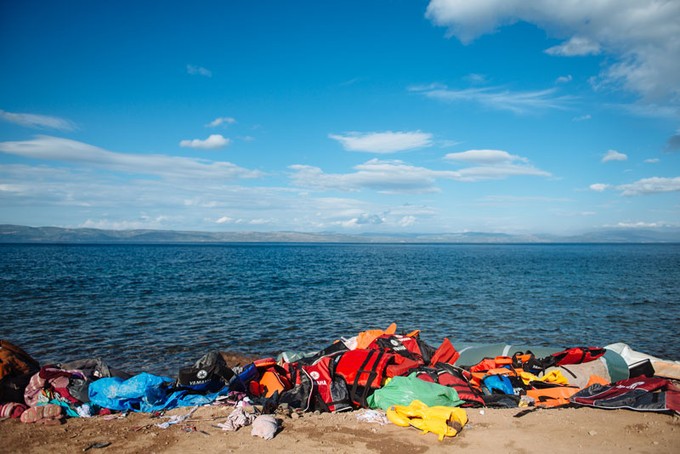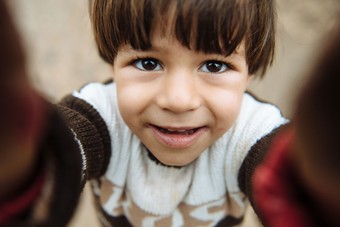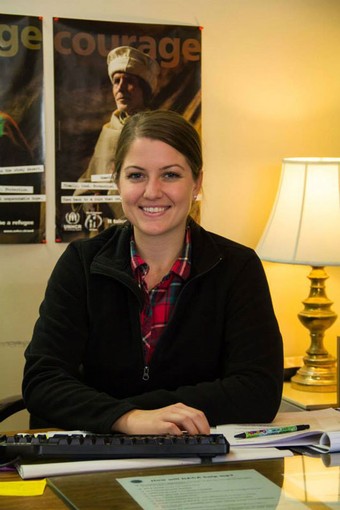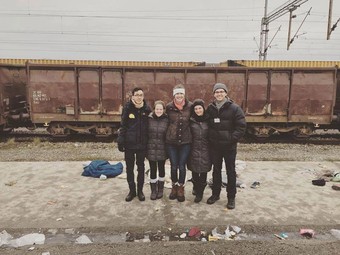
The people of God have always been refugees. The instant we were banished from Eden, we became wanderers. The minute we fled Egypt, we were displaced. The refugee is a familiar figure in our collective history. And never in history has the plight of the refugee been as visible as it is today.
According to the United Nations High Commissioner of Refugees (UNHCR)’s 2016–2017 Global Appeal, there are nearly 55 million refugees, asylum seekers, internally displaced persons, individuals under the UNHCR’s statelessness mandate and other persons of concern in the world today. In comparison, the 2014–15 report identified 35.8 million individuals in the same marginalized group. The rapid growth of this already massive population is staggering.
Biolans are stepping up to help. Alumni and students have scattered across the globe to alleviate the suffering of physically displaced people groups. Some feel the historical and cultural significance of the Christian’s status as sojourner and exile. Others hear the voice of God calling them to the ends of the earth. However they found their way into this work, these Biolans in Macedonia, North Korea, Greece and Orange County demonstrate the kindness and love of God toward the foreigner.
The Greek Islands
Olivia Blinn ('14)
In the two years since she graduated from Biola, Olivia Blinn (’14) has been deployed on disaster assistance response teams (DART) with Samaritan’s Purse to Cambodia, Nepal, Ecuador and Greece. In Greece, Blinn has joined hundreds of relief workers who are addressing humanitarian needs accompanying the largest migration of people into Europe since World War II.

Blinn is an information officer for Samaritan’s Purse and executes logistics for internal and external reporting, both by delivering raw content for stories back to Samaritan’s Purse headquarters and also by tracking, monitoring and evaluating systems on the ground as an implementing arm for the UNHCR. This means that she is tracking items distributed by Samaritan’s Purse on the ground as they are daily dispersed to incoming populations. With about 850,000 migrants from Turkey to Greece alone in 2015, monitoring all of this is no small feat.
Refugees are arriving in overwhelming numbers in the Greek Islands, coming off precarious boats that have survived the dangerous Mediterranean journey. They often arrive at these sites dripping wet, with only the clothes on their backs. Many of them lose their bags in the journey at sea, often because of smugglers who throw bags overboard to make room for more people, Blinn said. Once in Greece, refugees are taken to transit sites and registered with the Greek government before continuing on their migratory journey.
Working on the Greek Islands and hearing the stories of people battered by all manner of physical and emotional trauma has been a powerful experience for Blinn.
“It felt like for better or for worse, all of us on the ground were standing on the brink,” she said. Being on the front lines of the crisis as it unfolds has left her feeling a great weight and Christian responsibility to actively love people who society tells us are dangerous or “other.” Meeting Syrians and Palestinians who are Christians has challenged her cultural assumptions, and hearing tales of the threats they are fleeing was sobering.
Blinn said the incarnation of Christ motivates her to care for both the spiritual and physical needs of the refugees.
“The fact that we are fragile and we have to sleep, the fact that we are finite, makes us like Jesus,” she said. “It seems small to give someone a bar of soap, but I think it helps to affirm her humanity and dignity.”
In addition to giving them hygiene items and things like sleeping mats and blankets, Blinn and her colleagues, particularly those who speak Arabic and Farsi, sometimes engage refugees in talks about faith.
“We’re finding that there’s an incredible openness to the gospel,” she said. “Hearing the stories from our team working there has reminded me that God is big and is moving in mighty ways. In many of the home countries of these refugees, these conversations would be illegal or punishable by death. As one of my coworkers said, it’s as though the Lord has brought the harvest to us.”
North Korea
Justin Wheeler (’07)
Justin Wheeler (’07) is the vice president of a nonprofit organization called Liberty in North Korea (LiNK), which helps North Korean refugees escape through a covert route from Northern China into Southeast Asia. In Southeast Asia, fleeing refugees are connected to amnesty-friendly embassies that disperse these individuals to a free life.
How does such an organization even get off the ground?
“The Lord opens doors,” said Wheeler. He and his wife, Kira (’07), found themselves in China in 2010 and flew across to South Korea on a whim. They had heard that Passion Conferences founder Louie Giglio was in South Korea, and they went to hear him speak.
“Louie probably won’t remember us because we only chatted for 30 minutes,” said Wheeler, but Giglio connected him and his wife with a pastor and his family in South Korea.
This pastor, called “Paul” for the purposes of this article, was actually formerly a spy in China for the North Korean government. Paul’s responsibility was to find fleeing North Koreans in China and repatriate them or send them back to North Korea, where they would be sentenced to a horrific re-education camp. But it was Paul’s job, his livelihood. On one freezing winter night, he fell extremely ill and grew delirious. An underground Chinese church received him and nursed him back to health. Upon receiving such love and care from this church, Paul quit his post in China, went to seminary in South Korea and has since been helping North Koreans escape repatriation. Paul and Wheeler and their families met in 2010 and instantly understood their call. Today, Paul is instrumental in the LiNK mission.
Wheeler led LiNK’s first mission in 2010, a 3,000-mile journey from North Korea to Southeast Asia that involves evading Chinese military security, securely crossing several borders and getting the team safely to a U.S. or South Korean embassy. A resettlement team helps refugees make the transition from North Korea to their brave new world. Survivors learn such skills as how to use a computer, how to operate an online banking system, how to use public transportation, how to earn scholarships to attend college and how to pursue their career dreams and goals.
For Wheeler, the process of getting involved in the work of LiNK has illustrated God’s sovereignty in orchestrating our vocational callings.
“We can plan and plot all we want,” he said. “We can decide how we want to change the world for good.” But in the end, he said, no human-made plan could have led the Wheelers to travel from Southern California to China to South Korea to North Korea and down to Southeast Asia. The Lord established their steps, so that they could help secure the steps of freedom for others.
Orange County, California
Leah Wills (’13)
Leah Wills (’13) is a case manager for World Relief in Orange County, California, an organization that has empowered the church to serve the most vulnerable since 1944.

Wills works in the Preferred Communities program, which helps serve clients with the greatest needs. For example, when an asylum seeker is newly received, they have three months with an agency to obtain housing, employment and social services benefits, and fulfill many more requirements in order to stay in the U.S. In addition to these administrative hurdles, most clients are suffering from high stress levels and trauma from what they have fled. When they are received by a foreign state such as the U.S., these traumas quickly surface because their hearts and minds have space to process what they could not think about before.
This is when Wills comes in. Her role is to assess what issues the client has and what needs must be met. Refugees come from all over the globe and have different needs. She arranges everything from English classes to job skills training to helping her clients find community in local churches.
Wills once managed the case of a political refugee from Iran who was tortured by the Iranian government and suffered from mental and physical illness. When he came to Wills, she was only three months into her job and she had, in her words, “no idea what [she] was doing.” She had hit the ground running, learning constantly as she went.
Helplessness weighed on her. It dawned on her that she was his only option in life. She felt desperate. She was trying to fill out disability and appeals forms, papers in hand, looking wild-eyed. A coworker with 25 years of experience in the Department of Immigration looked at her and asked, “Leah, have you even prayed about it yet?” This was a turning point for her.
“All these barriers are barriers and they are hard, but God can do anything and he can equip you to do anything,” she said. “He has to be first. Following his guidance is foremost.”
When she was a student at Biola, Wills remembers that there were refugee families in the apartment complex where she lived. She made it a point to get to know those families, to spark a conversation with her neighbor, to get to know a person who was different from her — to make a friend.
And this is exactly what she encourages other Christians to do. In the midst of a global refugee crisis that means more and more displaced foreigners are seeking asylum in our communities, on our streets and in our churches, there are three simple words that can make a huge difference, she says.
“Be a neighbor.”
Skopje, Republic of Macedonia
Heather Spradley (’16)
A small band of seniors from Biola are hunched over a tiny home stove, all four burners burning. Heather Spradley (’16), Sophia Panayiotou, Ian Koh, Katlin Puchalski and Gavin Sweeney are boiling eggs in Spradley’s parents’ home — several thousands of eggs for their journey to Tabanovce on the northern border of Macedonia later that day. The stench is incredible. Heather and her team laugh. They thought they were going to do something about the Syrian refugee crisis — and here they are halfway across the world in a small Macedonian kitchen, boiling eggs.

It’s below freezing out and everyone’s packing their boxes of eggs, bananas and oranges to hand out to the ocean of faces descending from trains, approaching tents of relief workers in waves. During their Interterm trip this past winter, Heather and her friends calculated that they met at least 10,000 people. Ten thousand. Many of them didn’t even know what country they had landed in.
A woman shouts, “Pants!” and points to her son. Panayiotou (’16) rummages through a truckload of clothing but can’t find any. The mother grabs Panayiotou’s arm and says, “No! Look! Pants!” She lifts the blanket from off her son’s body and he is naked from the shirt down. The freezing wind bites his skin.
Eggs and pants. Often this is the reality, the smallness of what we can actually offer as the hands and feet of Christ, Spradley said. But there’s somehow comfort in confronting this smallness, knowing that we are part of something so much more, she said.
The Spradley family arrived in Macedonia with SEND International over 20 years ago. When the refugee crisis began stirring the streets of Skopje, Heather’s parents (Nadine and Andy) began leading volunteer teams from their churches in Skopje to Tabanovce. In Tabanovce, several organizations operate together at the border, distributing enormous truckloads of food and clothing every day. There is a phone-charging station so that individuals can contact their families. Many teams have established Facebook pages to keep in contact and to let passersby know that they are praying for them. Messages of safety flood these pages: “I’ve reached Berlin!”
At Biola last fall, Spradley was moved to begin a campaign to purchase provisions for those crossing the border. The result of her campaign exceeded everyone’s expectations. The recent trip was the result of students responding to the call to pray, donate and be sent to Macedonia.
Spradley, who will begin an M.A. in philosophy this fall at Harvard University, said her time on the Macedonian border reminded her that her Christian faith is not about being settled or having arrived.
“We often think, ‘I’ve arrived in my Christianity,’” she said. “But seeing all these people just made me realize how much we haven’t.”
We’re the same. Our citizenship too is elsewhere — oftentimes we don’t know where we are or what we need. Spradley recalls a man she met who told her, “I ran out the door from the Taliban, and ... here I am!”
Spradley and her team returned with a strong desire to spread awareness. The people these students met are not just UNHCR statistics; they are individuals with stories and lives.
“[Meeting them] makes everything in the news seem so silly. If you met any one of these people, and exchanged only a few words with them, you wouldn’t be saying ‘keep them out,’” she said. “For many of them, this is the first time they’re in a place of religious freedom of any sort. We’re doing so little for them, but at least we can give them a hard-boiled egg and a banana as they cross into Serbia. And we can pray.”
Ways You Can Help Refugees
Pray. Pray for the refugees and those who are helping them, as well as for the end to the wars and conflicts displacing so many. Consider holding prayer services specifically for refugees.
Learn. Educate yourself about the refugee crisis. The United Nations High Commissioner of Refugees (UNHCR) has good information at http://www.unhcr.org.
Give. Support Christian organizations such as those mentioned in this article, Samaritan’s Purse (samaritanspurse.org), LiNK (libertyinnorthkorea.org), SEND International (send.org) and World Relief (worldrelief.org).
Volunteer. It is LiNK’s goal this year to rescue 200 North Korean refugees; volunteer and internship opportunities can be found at libertyinnorthkorea.org. Through World Relief in Orange County, you can start a learning group, a good neighbor team, volunteer, intern or advocate; learn more at worldreliefgardengrove.org.
 Biola University
Biola University


